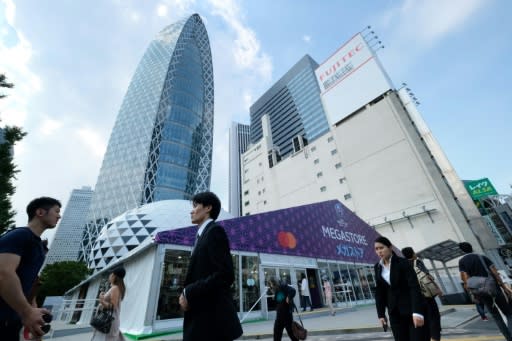Ale-ing economy? Japan eyes boost from Rugby World Cup
At Tokyo's "Rugby Dinner No Side Club", owner Takeuchi Masakazu is taking no chances: he has got in three times the usual amount of beer as Japan hopes to profit from the 400,000 fans expected for the Rugby World Cup. With just three weeks until the global showcase kicks off, business owners like Masakazu all over Japan are expecting a boom from the seven-week tournament, being held in Asia for the first time. As the owner of what he says is the only Tokyo bar exclusively devoted to the oval ball, for "Masa" the tournament is manna from heaven. "It's like a dream... I've got loads of reservations for the World Cup. It's almost full," he told AFP, saying he is receiving email enquiries from English, French, Kiwi and Australian fans. The 43-year-old, himself a former rugby player, is hoping to see takings double or even treble this year. To satisfy the expected demand, he is also doubling his staff, from five to 10 people. And after panicked headlines suggesting the Japanese hosts had under-estimated the amount of beer rugby fans consume, the message appears to have got through: stock enough amber nectar. "We held a seminar with owners of restaurants and bars, asking them not to run out of beer," said Naofuni Machidori, from the tourist office in the western city of Kobe. "We told them they need to have three to five times their normal stock," Machidori told AFP, insisting that the message had been well understood. - 'Precious opportunity' - World Cup organisers are expecting the tournament to contribute around 216 billion yen ($2 billion) to the Japanese economy, basing their predictions on a study by professional services firm Ernst and Young. This is a drop in the ocean for the world's third-largest economy but the tournament could bring some "real economic benefits" for regions and small towns outside the megacities of Tokyo and Osaka, said Shigeto Nagai, an analyst at Oxford Economics. The Rugby World Cup is being played at 12 locations across Japan and could provide a boost to some depressed areas that are facing "serious headwinds" in terms of ageing populations and natural disasters, Nagai told AFP. A prime example is the small town of Kamaishi in northern Japan, which was devastated by the 2011 earthquake and tsunami but is hosting two matches at the World Cup's only purpose-built stadium -- part of a general effort to use sport to regenerate the area. This is a "precious opportunity" to boost inbound tourism to less well-off areas ahead of the 2020 Tokyo Olympics, said Nagai, although he voiced doubt over whether some of the more out-of-the-way regions were ready for the challenge. "The question is whether those regions can really entertain those people," he said. "There is a lot of goodwill, but language skills are often terrible" across the country, he added. However, ticket sales have been brisk and organisers are hoping that seeing the world's best will rekindle a love of rugby in Japan amid falling crowds for the club game. At a merchandising store in the heart of the Shinjuku area of Tokyo, trade was encouraging on the first day, with families, tourists and salarymen flooding in to buy replica shirts and other World Cup trinkets. With 80 pop-up stores across the country, "we are hoping that we'll have in excess of a million customers throughout the whole period," said Nick Price, chief commercial officer at Legends International, which operates RWC merchandise. Meanwhile, Kobe tourism official Machidori assured England fans travelling to Kobe for the September 26 clash Pool C against the United States that they need not fear empty kegs. "We have games with England and we heard that their fans drank a large amount of beer last time," he said. Japan is hoping for a $2 billion economic boost from the Rugby World Cup Pop-up megastores will sell Rugby World Cup merchandise around Japan



